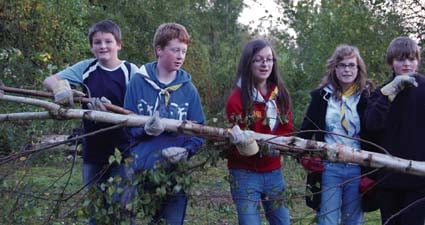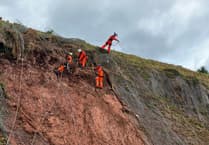FORESTRY Commission Wales acted to save the home of endangered butterflies – with a little help from local Scouts and some wild strawberries.
Trees growing in Slade woodland near Magor in Monmouthshire were threatening an open area of wild strawberries – the preferred habitat for the Grizzled Skipper butterfly.
This rare butterfly likes to lay its eggs on the warm strawberry plants, where the larvae then build a series of tents by spinning together the edges of leaves which protect them as they grow.
Eventually, the leaves of the wild strawberry provide food for the emerging pupae – but the number of trees encroaching into the small quarry nestled in the woodland were putting the butterfly's future at risk.
So Forestry Commission Wales, which manages the woodland on behalf of the Welsh Assembly Government, enlisted the support of the Magor Explorer Scouts to clear the silver birch trees which threatened their precious habitat.
FC Wales Community ranger Emma Louise Felkin and the Scouts used bow saws and pruning saws to cut down the trees and then dragged them away to leave an open clearing for the butterflies.
Emma said: "This was recommended by Butterfly Conservation as urgent work to keep the rare species in the woodland.
"The Scouts did a marvellous job in helping to maintain and increase this open-spaced habitats which, hopefully, will encourage population growth of these rare butterflies."
As well as improving the survival prospecs for the butterflies, the work will also help the Scouts to gain their Community Activity badge.
The woodland, near Magor and Rogiet, is one of the most important sites for butterflies and moths in south-east Wales, where some of Europe's most endangered species can be found.
A recent survey carried out by Butterfly Conservation on behalf of FC Wales recorded Dingy Skipper and White Admiral butterflies, as well as the Grizzled Skipper.
These are all priority species of butterfly, which means their numbers have declined by more than 50per cent in the UK and are threatened internationally.
Martin Anthoney, Butterfly Conservation's county recorder for butterflies and moths, said, "The mixed woodland and wide, botanically-rich 'rides' – open areas – provide food for 29 species of butterfly and over 250 macro- (larger) moths, including UK and Wales Priority species.
"The butterflies need woodland edges, glades and recently cleared areas to flourish and regular maintenance work is necessary to maintain the quality of the habitat and to prevent the rides and open areas scrubbing over."
The work to open up larger areas has now been incorporated into the management programme for Slade woodland so that, when conifer trees are thinned, a beneficial habitat for the butterflies will be created by clearing trees from selected areas.





Comments
This article has no comments yet. Be the first to leave a comment.